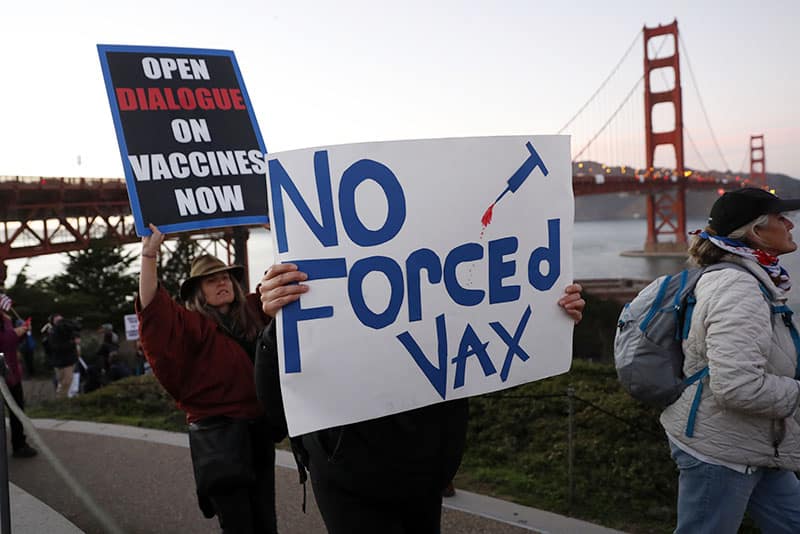A US district court in Georgia became the fourth court to enjoin a Biden Administration vaccine mandate this week. As with the other trial and appellate courts, District Judge R. Stan Baker found that President Biden has exceeded his authority in mandating the vaccine for all federal contractors. In the meantime, outgoing New York Mayor Bill DeBlasio has ordered all private workers to be vaccinated. All of these mandates are on course for a showdown in the Supreme Court where three justices have already expressed skepticism over the mandates.
Biden issued an executive order on Sept. 9 that required contractors to ensure that their workers are vaccinated against Covid and enforcing mask and social distancing policies. Contractors were given until Dec. 8 to comply but that was later extended to Jan. 4.
The US District Court for the Southern District of Georgia granted a preliminary injunction in favor of the Associated Builders and Contractors, a national trade group that represents the construction industry. To do so, the court had to find that the challengers were likely to prevail on the merits in arguing that President Biden does not have this authority under the Procurement Act.
Judge Baker wrote “In its practical application, it operates as a regulation of public health. It will also have a major impact on the economy at large, as it limits contractors’ and members of the workforce’s ability to perform work on federal contracts. Accordingly, it appears to have vast economic and political significance.”
White House press secretary Jen Psaki insisted that the Biden Administration is “confident in our ability legally to make these happen across the country.” While the Administration could certainly prevail on appeal, the confidence remains an exercise of hope over experience in such litigation.
Other courts have enjoined mandates under OSHA and medicare. In the OSHA case, the United States Court of Appeals for the Fifth Circuit ruled based on its own “serious constitutional concerns.”
Chief of Staff Ron Klain went to Twitter to herald the use of OSHA as a “work around” of the constitutional limitations placed on President Biden. I asked how a court would respond to such an admission. We have to wonder no more. Late Friday, the United States Court of Appeals for the Fifth Circuit cited Klain’s comment in its decision enjoining the mandate.
In the prior column, I noted Klain acknowledged that the use of OSHA was a “work around” in light of the constitutional barriers preventing President Biden from ordering a national mandate directly. The Fifth Circuit quoted Klain in a footnote in granting its injunction.
Biden and Klain often seem to be competing for the greatest admissions-against-interest, including a prior admission from President Biden that they would be pursuing a presumptively unconstitutional measure simply to buy more time to spend more money on the now defunct eviction moratorium. Klain was celebrating a way to evade constitutional limitations — but for courts reviewing the OSHA rule, that is akin to a husband telling a spouse that he has found a “work-around” to his vows by redefining extramarital relations.
The federal litigation raises separate issues from those likely to be raised against de Blasio’s mandate. New York will rely entirely on Jacobson v. Massachusetts (1905), where the Supreme Court upheld a state smallpox vaccination mandate. The case has already been used successfully in other courts like the Seventh Circuit, including decisions from conservative jurists. See Klaassen v. Trustees of Indiana Univ., No. 21-2326, 2021 WL 3281209 (7th Cir. Aug. 2, 2021) (“Given Jacobson v. Massachusetts…there can’t be a constitutional problem with vaccination against SARS-CoV-2 [aka COVID-19]”). They have applied the low “rational basis” standard to uphold such mandates in light of Jacobson.
Jacobson is not a lead pipe cinch of precedent. It involved smallpox, a disease with a much higher lethality of up to 30% of those infected. The disease also hit children to a far greater extent than Covid. It also involved a vaccine that was used for years and was universally accepted as safe. The case also involved only a $5 fine as opposed to being barred from employment, dining, travel and other basic functions in life.
On October 29, 2021, three Supreme Court justices dissented in a case where they felt review should have been granted. Justices Gorsuch, Thomas, and Alito raised questions over whether past deference on the pandemic is warranted and warned that the “compelling interest” recognized in such past cases “cannot qualify as such forever.”
Many of us support vaccinations. The question is the legal authority to require others to be vaccinated. Jacobson is likely to carry considerable weight in the review of state and city mandates.
However, the question is whether courts will demand more from the government in addressing issues of religious exemptions and natural antibodies. Studies indicate that such natural antibodies confer greater protection than vaccines though most doctors still encourage vaccinations. Over the last year, courts have remained highly deferential. However, the three justices previously noted that “if human nature and history teach us anything, it is that civil liberties face grave risks when governments proclaim indefinite states of emergency.”
Reprinted with permission from JonathanTurley.org.


